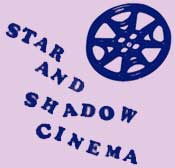The Art Of Dissapearing / Sztuka Znikania (2013) + 2 Short Docs By Krzysztof Kieslowski_#1 Looking East Season
Dir. Bartek Konopka, Piotr Rosolowski, Haitian Creole [English Subtitles] , Poland
-
Sun 6 April 2014 // 19:00
/ Cinema
THE ART OD DISAPPEARING
A young Haitian voodoo priest Amon Fremon is about to introduce the members of the Theatre of Sources (Teatr Źródeł)- the great theatre reformer Jerzy Grotowski group- to shamanic practices. Poland was a strange place for him. Even the rain was louder.People gathered in queues for hours, but never spoke to each other.
It is the year 1980. Poland is overcome by both economic and political crises.But for some reason he decides to stay longer.He believes that General Jaruzelski is possessed by an evil demon by the name of Baron Samedi, who causes him to have a rigid attitude, bloodshot eyes and the need to wear dark glasses.

A romantic poet Adam Mickiewicz is leading him into the underworld to help contact Polish ancestors. the same ones that 200 years ago, as the Legionary soldiers, helped liberate Haiti from slavery. The spirit of the Polish romanticism unites with the Haitian Loa.
Finally he decides to perform a great voodoo ceremony to free the Polish people from evil forces. The dead and alive unite in battle.
The Art of Disappearing takes us inside his experience in the form of a trance-like cinematic essay, combining dreamlike images with archival footage. A medium-length film that’s simply remarkable, in every respect.
Bartek Konopka and Piotr Rosolowski (the director and co-writer of Rabbit à la Berlin, nominated for the Oscar for Best Documentary Film, 2010) have created a history lesson told from an unusual, off-kilter angle.
TRAILER
Two short documentaries by Krzysztof Kieslowski to be screened as an introduction to the subject.
THE OFFICE''Urzad''- org.
Runtime: 5 min, Black and White

In an office processing pension applications, people wait. Clerks give instructions and explanations, finding fault with each document presented. People smoke, standing in line with papers in hand. A clerk sharpens a pencil methodically. Papers are stamped, further instructions given. Someone makes tea. The clerks take their break while people wait quietly. Papers have been stacked, sorted, placed in folders, and filed - row upon row, shelf upon shelf of files.
TALKING HEADS
''Gadajace Glowy''- org.
Runtime: 15 min, Black and White

Three questions. Who are you ? When were you born ? What is important for you ? No flashy camera work and some fascinating answers. Krzysztof Kieslowski interviewed a number of ordinary Poles (born at various times over the preceding 100 years1880-1980). The results were assembled into this short film. What strikes one today, whether it is a sign of communist Poland at this time, or merely of directors own fascination with moral questions, is how sombre and serious most of the answers are. It's also captivating how similar the answers are, despite the great age difference of the participants. Jacek Petrycki carefully films these replies to deliver frank views about the life from ordinary people.
Krzysztof Kieslowski
Graduated from Lódz Film School in 1969, and became a documentary, TV and feature film director and scriptwriter. Started his career shooting documentaries and It grouped several Polish directors, including Krzysztof Zanussi and Andrzej Wajda, and aimed at depicting the conditions of Poles under communism, later became associated with the "cinema of moral anxiety" movement. His best known work was the Three Colors trilogy: Three Colours: Red (1994), Three Colours: White (1994) and Three Colours: Blue (1993). Three Colours: Red (1994) brought him Academy Award nominations for best director and best screenplay (with Krzysztof Piesiewicz) in 1995, Three Colours: Blue (1993) shared the Golden Lion at Venice in 1993, and Three Colours: White (1994) earned the best director award at Berlinale in 1994.
[Source: IMDb Mini Biography By: Zbigniew Pasek zbigniew@engin.umich.edu]
TICKETS
